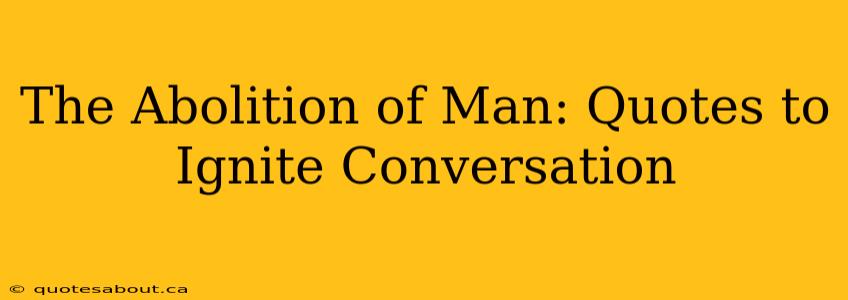The Abolition of Man: Quotes to Ignite Conversation
C.S. Lewis's The Abolition of Man isn't just a book; it's a call to arms, a philosophical warning disguised as a literary critique. Published in 1943, its relevance continues to resonate powerfully in our increasingly technologically advanced and morally ambiguous world. This exploration delves into some of the most thought-provoking quotes from the book, examining their meaning and sparking conversation about their enduring implications. We'll unpack Lewis's central argument about the dangers of subjective morality and the potential for the "abolition of man" – a chilling prospect that still holds significant weight today.
Understanding the Core Argument: The Threat of Subjectivism
Lewis's central thesis revolves around the insidious nature of subjectivism in education. He argues that a purely subjective approach to morality, one that dismisses objective truth and values, ultimately leads to the dehumanization of humanity. He meticulously dissects the flaws in the "reductive" approach to education prevalent in his time, showing how it diminishes the human capacity for moral reasoning and ultimately paves the way for totalitarian regimes. This is powerfully encapsulated in his famous quote: "The task of the modern educator is not to cut down jungles but to irrigate deserts." This isn't simply about imparting knowledge; it's about cultivating the moral and intellectual soil upon which true humanity flourishes.
Key Quotes and Their Implications:
Here are some key quotes from The Abolition of Man that deserve closer examination, along with their implications and answers to frequently asked questions:
"We make men without chests and expect of them virtue and enterprise. We laugh at honour and are shocked to find traitors in our midst."
This quote highlights the disastrous consequences of prioritizing reason and logic over emotion and moral intuition. Lewis argues that a purely rational education, devoid of the cultivation of virtue, creates individuals capable of great intellect but lacking the moral compass necessary for ethical decision-making. The absence of a "chest," representing the seat of emotions and moral sentiments, results in individuals susceptible to manipulation and devoid of true virtue.
What exactly does Lewis mean by "men without chests"?
Lewis uses the metaphor of "men without chests" to represent individuals lacking the capacity for moral feeling and intuition. This isn't a rejection of reason, but rather a critique of a purely rationalistic approach to education that neglects the cultivation of virtues like courage, compassion, and humility. These qualities, he argues, are essential for a flourishing human life and a just society.
"To be incommunicable by Scientific language is, so far as I can judge, the necessary condition of being valuable."
This quote emphasizes the limitations of scientific language in capturing the full richness and depth of human experience. Lewis argues that what truly matters in life – love, beauty, goodness – often transcends the confines of scientific analysis. He isn't rejecting science entirely but stressing the need to recognize its boundaries and the irreplaceable importance of other forms of knowledge and understanding.
How does this relate to the modern emphasis on data and metrics?
This relates directly to our current obsession with data and metrics. While these tools provide valuable insights, they often fail to capture the qualitative aspects of human experience. Reducing human value solely to quantifiable metrics risks dehumanization and a loss of what truly matters in life. Lewis cautions against reducing complex human endeavors to easily measurable outcomes.
"I am not thinking of a merely external authority, like the State or the Church, but of the Tao itself."
This introduces the concept of the "Tao," a concept Lewis uses to represent the objective moral order inherent in the universe. The Tao is the underlying pattern and order that transcends any particular culture or ideology. It is the source of all true value and the foundation upon which a genuinely human life can be built. The Tao is not created by man but discovered through reason and experience.
What is the "Tao" in the context of The Abolition of Man?
The "Tao" in Lewis's work is not a specific religious doctrine but a universal moral order that exists independently of human opinion. It's the set of objective values and principles that guide ethical behavior and shape a virtuous life. Lewis argues that the recognition of this Tao is essential for the preservation of humanity.
"It is the doctrine of objective value, the belief that certain attitudes are really true, and others really false, to the kind of thing the universe is and the kind of things we are."
This quote summarizes Lewis's central argument for the existence of objective moral truths. He emphasizes that our values aren't arbitrary but are rooted in the nature of reality itself. Recognizing and adhering to these objective values is crucial for the maintenance of a healthy human society.
Conclusion: A Timeless Warning
Lewis's The Abolition of Man remains a chillingly relevant work in our modern age. His warnings against the dangers of subjective morality and the potential for the dehumanization of humanity are as urgent today as they were in 1943. By carefully considering these quotes and the questions they raise, we can engage in a meaningful dialogue about the challenges facing humanity and the importance of cultivating a truly humane and just society. The conversation ignited by this book, far from being a historical exercise, is a crucial one for our future.

